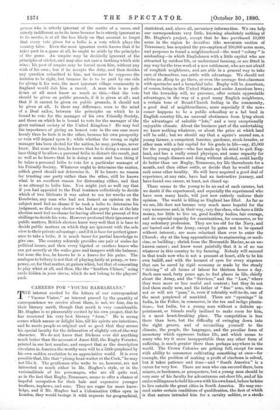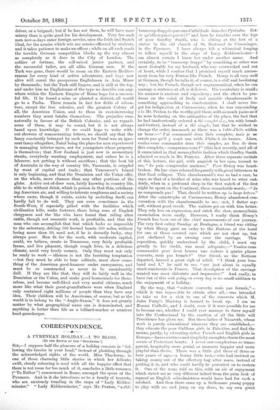CAREERS FOR "YOUNG BARBARIANS."
THE interest excited by the letters of our correspondent " Vacuus Viator," an interest proved by the quantity of correspondence we receive about them, is not, we fear, due to their literary merit, though that merit is very considerable. Mr. Hughes is so pleasurably excited by his own project, that he has recovered his very best literary "form." He is seeing scenes which amuse or delight him, till his spirits are infectious, and he meets people so original and so good that they arouse his special faculty for the delineation of slightly out-of-the-way character. We do not know that Dickens ever did anything much better than the account of Amos Hill, the Rugby Forester, printed in our last number, and suspect that as the description circulates in America the worthy man will be a little perplexed by his own sudden revelation to an appreciative world. It is even possible that, like that" plump head-waiter at the Cock," he may not like it. The gentlemen who write to us, however, are not interested so much either 'in Mr. Hughes's style, or in the. verisimilitude of his personages, who are all quite real, as in the fact that Rugby, Tennessee, seems to offer a chance of hopeful occupation for their hale and expensive younger brothers, nephews, and sons. They are eager for more know- ledge, and if Mr. Hughes had a Colonisation Office open in London, they would besiege it with requests for geographical,
statistical, and, above all, pecuniary information. We can help our correspondents very little, knowing absolutely nothing of Mr. Hughes's project, except that he has purchased 50,000 acres in the region he describes (the mountain section of Tennessee), has acquired the pre-emption of 350,000 acres more, and proposes to found a neighbourhood—the word " colony " is misleading—in which Englishmen with a little capital who are attracted by outdoor life, or understand farming, or are fitted in any way for the true work of a new settlement, who are not afraid of roughish neighbours, and are able in a general way to take care of themselves, can settle with advantage. We should not advise an 2Esop to go there, or even the average first-classman with spectacles and a bronchial tube. Rugby will be American, of course, being in the United States and under American laws ; but the township will, we presume, offer certain appreciable advantages, in the way of a good many English neighbours, a certain tone of Broad-Church feeling in the community, a good deal of neighbourliness, more especially if the new. comer happens to be a public schoolboy or a lad bred in English country life, an unusual abstinence from lying about the advantages of saleable "lots," and a very exceptionally enjoyable climate. About the business part of the undertaking we know nothing whatever, or about the price at which land will be sold ; but we should say that a squire's second son, a young farmer, a competent forester, gardener, stock-breeder, or other man with a fair capital for his grade in life—say, 21,000 for the young squire—who has made up his mind to quit Eng- land, and has a really sound physique, and some capacity for bearing rough dinners and doing without alcohol, could hardly do better than see Rugby, Tennessee, try life thereabouts for a month, and then either settle, or decide that he would rather seek some other locality. He will have acquired a good deal of experience, at any rate, have had an instructive journey, and have found one career, at least, not closed up.
There seems to the young to be no end of such careers, but we doubt if the experienced, and especially the experienced who have seen many lands, will just now entirely endorse their opinion. The world is filling as England has filled. As far as we see, life does not become very much more hopeful for the very numerous and, in their way, very fine class, who have a little money, too little to live on, good healthy bodies, fair courage, and no especial capacity for examinations, for commerce, or for any sedentary profession. They are too old for the Navy, and are barred oat of the Army, except by gates not to be opened without interest; are more reluctant than ever to enter the Church ; shy at the long apprenticeship to engineering, or medi- cine, or building ; shrink from the Mercantile Marine, as an un- known career ; and know most painfully that it is of no use whatever in this country to try farming. Nobody will succeed in that trade now who is not a peasant at heart, able to be his own bailiff, and with the keenest of eyes for every sixpence that can be saved by rigid economy or made by the steady " driving " of all forms of labour for thirteen hours a day. Such men used, forty years ago, to find places in life, chiefly about the Army, and the "Services," and the "Law," where they were more or less useful and content ; but they do not find them easily now, and the father of " fine " sons, who can- not or will not "pass," is, even if tolerably well-to-do, one of the most perplexed of mankind. There are " openings " in India, in the Police, in commerce, in the tea and indigo planta- tions; but India, for a young man without a definite ap- pointment, or friends really inclined to make room for him, is a most heart-breaking place. The competition is less there than here, but the difficulty of swinging down into the right groove, and of reconciling yourself to the climate, the people, the languages, and the peculiar form of monotony which oppresses Indian life, and which seems to many who try it more insupportable than any other form of suffering, is much greater there than perhaps anywhere in the world. The Crown Colonies are getting full, except for men with ability to commence cultivating something at once—for • example, the problem of making a profit of cinchona is solved, but it takes patience and time—and "South America" is a career for very few. There are men who can succeed there, born miners, or herdsmen, or prospecters, but a young man should be very sure of his faculty for adventurous out-door life, and of his entire willingness to hold his own with his ownhand, before hetries to live outside the great cities in South America. He may suc- ceed under certain conditions of qualification, the first of which is that nature intended him for a cavalry soldier, or a stock.
driver, or a brigand ; but if he has not them, he will have more misery than is quite good for his development. Very few such men now-a-days enter foreign service, once the Irish and Scotch ideal, for the armies which win are armies officered by students, and it takes patience to make an officer ; while on all such roads the terrible German competition blocks up the way almost as completely as it does in the City of London. The soldier of fortune, the self-raised junior partner, and the successful tailor, are all alike German now. If the Turk was gone, there would be room on the Eastern Mediter- ranean for every kind of active adventurer, and boys now alive will count the prosperous Englishmen in Asia Minor by thousands; but the Turk still lingers, and is still at the top, and under him no Englishman of the type we describe can any- where within the Eastern Empire of Rome hope for a success- ful life. If he found a mine or planted a district, all would go to a Pasha. There remain in fact few fields of adven- ture, except the free colonies, and the greatest Colony of all, the American Union, and to them in ever-increasing numbers they must betake themselves. The prejudice runs naturally in favour of the British Colonies, and as regards some of them, it may be sound, but it is not always based upon knowledge. If we could hope to write with- out showers of remonstrating letters, we should say that the fancy constantly betrayed by such men for Natal was an igno- rant fancy altogether, Natal being the place for men experienced in managing inferior races, not for youngsters whose property is themselves ; that New Zealand is just now in momentary straits, everybody wanting employment, and unless he is a labourer, not getting it without sacrifices ; that the best bit of Australia in the way of country life, Tasmania, is crippled by want of capital and trade; that Vancouver's Island is only beginning, and that the Dominion and the Union offer, on the whole, more chances than any other portions of the globe. Active out-of-door men, fairly knowing in country life, able to do without drink, which is poison in that thin, exhilarat- ing American air, and willing to tolerate roughness and a society where caste, though it exists, exists by secluding itself, can hardly fail to do well. They can even sometimes in the South-West, if especially gifted with the facilities which civilisation kills, make fortunes, there being sons of English clergymen and the like who have found that riding after cattle, though not romantic work, is profitable, and that the man who can accomplish that feat which looks so impossible to the sedentary, driving 500 horned beasts 500 miles, without losing more than 50, need not, if he is decently lucky, stay always poor. Men fit for the work, with moderate capital, could, we believe, create in Tennessee, very fairly profitable farms, and live pleasant, though rough lives, in a delicious climate, amid very lovely scenery. Only they must not only be ready to work — idleness is not the besetting temptation —but they must be able to bear solitude, must show some- thing of the American good-humour under annoyances, and must be so constructed as never to be unendnrably dull. If they are like that, they will do fairly well in the Dominion or the Union, and make good homesteads for them- selves, and become well-liked and very useful citizens, much more like what their great-grandfathers were when England only contained eight millions of people than they have any idea. Their children will be Americans, of course, but as the world is to belong to the "Anglo-Saxon," it does not greatly matter by what geographical name one is denominated, and anything is better than life as a billiard-marker or amateur head-gamekeeper.







































 Previous page
Previous page